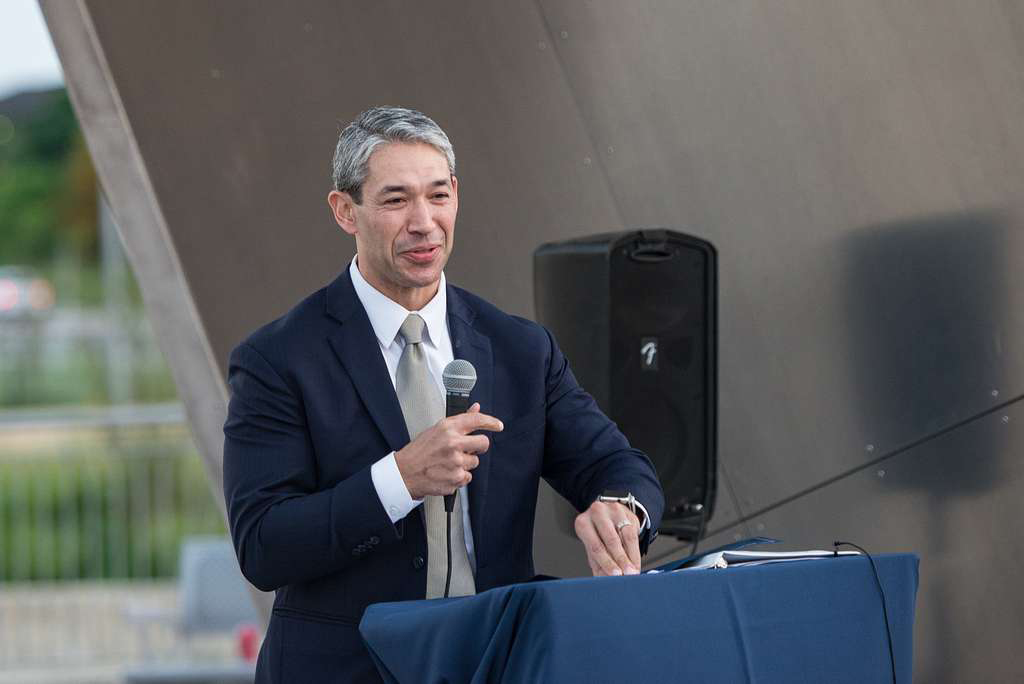(RNS) — When I first saw an announcement that the mayor of my hometown would be speaking at last month’s Parliament of the World’s Religions, I thought it was a mistake. Why would a leader from a city in South Texas join a hundred-year-old interfaith gathering on religion?
As a San Antonio native, I knew Mayor Ron Nirenberg’s politics well enough to know that he’s not a run-of-the-mill politician; he’s innovative and caring in ways that most Americans are not used to. When I saw on the program that he was going to be at the parliament to talk about compassion, his appearance began to make sense. The mayor has been speaking about the importance of compassion for as long as I’ve known of him.
Most recently, at the U.S. Conference of Mayors meeting in June, Nirenberg launched an initiative, Compassionate USA, a response in part to the school shootings that have brought such deep trauma to our communities, but in his words at the launch, more than that: “an earnest and honest remedy to political polarization, civil discord, racialized violence, and the far-reaching impacts of a global pandemic.” At the parliament, he would be getting the Charter for Compassion’s Karen Armstrong Award for this effort.
In a way, my surprise at his commitment to compassion reflects a sad state of affairs. Wouldn’t we be so much better as a country if compassion were a normal concern for politicians and not the exception? How different could our world look if we cared for our fellow citizens as much as we cared for our loved ones?
When I was last home, I asked the mayor if I could come talk to him about his commitment to compassion. Nirenberg said he doesn’t recall a specific moment from his personal life when he realized the importance of compassion. It’s something he said he was raised with — a practice of treating all people with dignity and respect. He also doesn’t see a moment in his professional life when he decided to start engaging compassion.
“As I pursued public office here in San Antonio,” he told me, “compassion was part of my basic vernacular and foundational to what I wanted to do in my life. Everything I wanted to do to serve the city was rooted in compassion. How we treat others the way we want to be treated. How we build a city people would enjoy living in.”

San Antonio Mayor Ron Nirenberg speaks during the Tribute to Freedom sculpture grand opening, March 27, 2019. Photo by Andrew C. Patterson/U.S. Air Force/NARA/Creative Commons
Politicians, of course, know how to throw around words like dignity or compassion. Searching to see if Nirenberg’s commitment ended at his talking points or if there was more beneath the surface, I asked Nirenberg to tell me more about the relationship between compassion and public policy. He schooled me in a few short sentences.
“First, we have to understand that compassion is action,” he said. “Compassion is distinguished from empathy, which is also important. Empathy is about putting yourself in someone else’s shoes and understanding their experience. Compassion is taking that feeling and acting on that to help ease someone’s suffering.”
For a politician, action is policy. “I believe all public policy is ultimately rooted in how we solve people’s problems,” Nirenberg continued. “Good public policy recognizes that we create strong policies when we’re standing on compassion. I’ve learned that we go wrong when we forget that. This is why, for me, compassion and public policy are inseparable.”
In San Antonio, Compassionate USA is a collaboration with a consortium of local community colleges known as the Alamo Colleges District; the San Antonio Peace Center and the city of San Antonio itself. Participants begin with a six-part curriculum that includes videos, resources and guidance on promoting compassion in communities.
It is Nirenberg’s hope that the initiative will help normalize compassion in our world today.
“Compassion has been presented as the polar opposite of strength and stoicism. Compassion sounds soft because that’s the connotations we put on it,” he said. “But it’s not. It takes significant strength and constitution to understand someone’s suffering and to be willing to address it. Being compassionate brings us together and creates a stronger community, and being compassionate is a prerequisite to being happy.”
This article has been corrected. Compassionate USA is collaborating with the San Antonio Peace Center, which is not affiliated with a center with a similar name at the University of Texas. RNS regrets the error.






